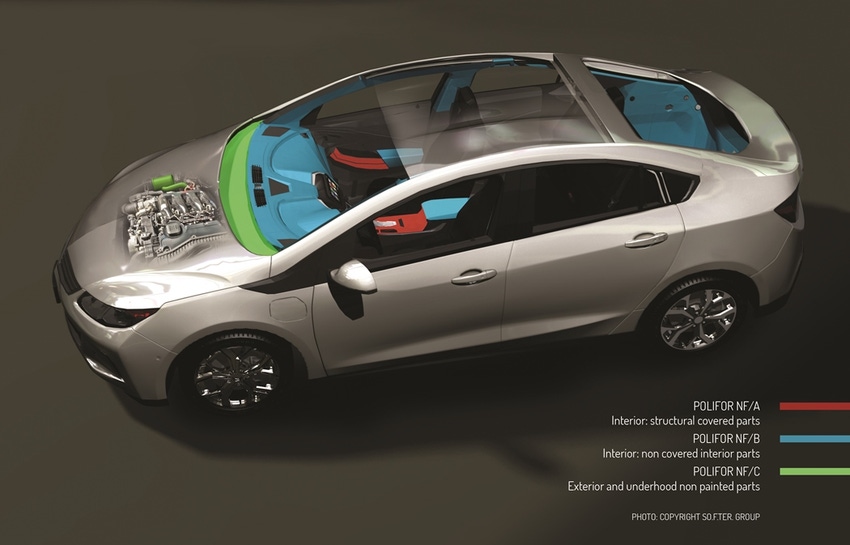While SO.F.TER’s natural fiber reinforced compounds are not new—this is the third year that the company is showcasing these products—they are, say the company, entering a new phase. “Before, we were in the development phase,” said a spokesperson at the company’s booth at the Fakuma trade show, which is taking place this week in Friedrichshafen. “Now, we are entering the industrialization stage.”
October 14, 2015

While SO.F.TER’s natural fiber reinforced compounds are not new—this is the third year that the company is showcasing these products—they are, say the company, entering a new phase. “Before, we were in the development phase,” said a spokesperson at the company’s booth at the Fakuma trade show, which is taking place this week in Friedrichshafen. “Now, we are entering the industrialization stage.” Italy-based SO.F.TER Group is one of the largest independent compounders worldwide, with a product range extending from thermoplastic elastomers to engineering plastics. The company has developed its Polifor NF product line, based on polypropylene reinforced with natural fibers, in close collaboration with a Tier 1 supplier working with an automotive company, who was interested in the benefits natural fibers could offer.
Italy-based SO.F.TER Group is one of the largest independent compounders worldwide, with a product range extending from thermoplastic elastomers to engineering plastics. The company has developed its Polifor NF product line, based on polypropylene reinforced with natural fibers, in close collaboration with a Tier 1 supplier working with an automotive company, who was interested in the benefits natural fibers could offer.
The company experimented with various different fiber sources and vegetable fillers, only a few of which could meet the specifications. Currently, three different types of natural fiber are used, each of which is suitable for different applications. No information was disclosed on the exact source of fiber, as this is part of SO.F.TER’s proprietary expertise. However, “the vegetable fillers used by SO.F.TER. come from FSC or PEFC certified cultivation, which adopt responsible management systems which have no negative impact on the environment, territory and local communities,” said the company.
The compounds offer the same rigidity as polypropylene (PP) compounds with the same percentage of talc, but are much lighter because of lower density (-8%), provide better resistance to high temperatures (+ 17%) and offer a significantly higher impact resistance (up to + 67% in the notched IZOD test). “This is a combination of qualities that are very attractive for automotive applications.”
According to SO.F.TER, these applications could include interior and exterior parts, both structural and aesthetic, such as the cowl vent grille, internal consoles and pillars, structural dashboard carrier and various parts of the luggage compartment. And, as the compounds are able to withstand operating temperatures up to 110-120 °C under-the-hood applications, such as the air filter box, are also possible.
The company was careful to stress that experience is needed to mold successfully with these products. “Obvious, because the fibers originate from natural sources, it is necessary to pre-dry the compounds and to store them carefully. Also, they must be molded at relatively low temperatures, to avoid burning. However, it’s not a problem for experienced molders,” said Roberta Ragonesi, at the SO.F.TER booth. The products molded using the Polifor NF compounds have excellent aesthetics, with smooth surfaces that are indistinguishable from talc-reinforced PP. The company has not produced compound using a polymer matrix other than PP—“The processing temperature of, for example, polyamide is too high to use with natural fibers,” said Ragonesi.
Polifor NF’s impact resistance qualities makes these compounds a good choice for the production of external casings, or for covers and protective housings of technical parts. More applications in the field of furniture and design are under development.
“We are currently cooperating with designers on the development of chairs made with our natural fiber-filled compounds. After all, chairs need to be strong, which is what these materials are,” said Ragonesi.
About the Author(s)
You May Also Like


